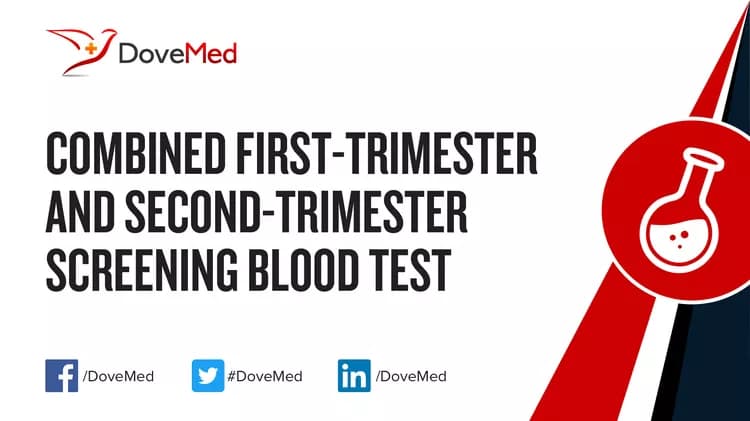
Combined First-Trimester and Second-Trimester Screening Blood Test
What are other Names for this Test? (Equivalent Terms)
- Integrated/Sequential Screening Blood Test
What is the Combined First-Trimester and Second-Trimester Screening Blood Test? (Background Information)
- Prenatal screening is performed to determine if a baby is developing properly in the mother’s womb. Screening may involve analyzing DNA or biomarkers obtained from the mother and/or from the growing fetus
- Disorders discovered through prenatal screening include trisomy 21, or Down syndrome. This is a developmental disorder associated with receiving extra-genetic material after fertilization
- Each cell in the body contains DNA in the form of rod-shaped structures called chromosomes. 23 chromosomes contain the entire DNA needed to give rise to a human being
- Most cells contain 2 copies of the 23 chromosomes, with the exception of the sperm and egg cells, which only contain 1 copy
- Down syndrome results when an individual receives an extra, partial, or full copy of chromosome 21 during early development. This extra-genetic material interferes with normal cellular processes, causing developmental abnormalities
- The Combined First-Trimester and Second-Trimester Screening Blood Test helps enable the detection of such genetic disorders before the baby is born. This provides the parents with valuable information that allows them to prepare to raise a child that may require special circumstances
- Screening may be performed as early as after the first trimester (weeks 1 through 12) of pregnancy to estimate the risk of the fetus having Down syndrome. If the test is positive, there is a high probability of Down syndrome
- Alternatively, if the result of the first-trimester screen is negative, the screen may be repeated after the second trimester. The result is then integrated with the first-trimester screen to estimate the risk of the fetus having Down syndrome
- Screening involves assessing levels of biomarkers (often proteins) associated with Down syndrome. Biomarkers assessed during the first trimester include PAPP-A, while those associated with the second trimester include AFP, uE3, and inhibin-A
What are the Clinical Indications for performing the Combined First-Trimester and Second-Trimester Screening Blood Test?
The clinical indications for performing the Combined First-Trimester and Second-Trimester Screening Blood Test include a family history of Down syndrome.
How is the Specimen Collected for the Combined First-Trimester and Second-Trimester Screening Blood Test?
Following is the specimen collection process for Combined First-Trimester and Second-Trimester Screening Blood Test:
Sample required: Blood
Process of obtaining blood sample in adults:
- A band is wrapped around the arm, 3-4 inches above the collection site (superficial vein that lies within the elbow pit)
- The site is cleaned with 70% alcohol in an outward spiral, away from the zone of needle insertion
- The needle cap is removed and is held in line with the vein, pulling the skin tight
- With a small and quick thrust, the vein is penetrated using the needle
- The required amount of blood sample is collected by pulling the plunger of the syringe out slowly
- The wrap band is removed, gauze is placed on the collection site, and the needle is removed
- The blood is immediately transferred into the blood container, which has the appropriate preservative/clot activator/anti-coagulant
- The syringe and the needle are disposed into the appropriate “sharp container” for safe and hygienic disposal
Preparation required: No special preparation is needed prior to the test.
What is the Significance of the Combined First-Trimester and Second-Trimester Screening Blood Test Result?
A positive value for the Combined First-Trimester and Second-Trimester Screening Blood Test may indicate:
- Trisomy 21 (Down syndrome), 95% of the time
- Trisomy 18
- Neural tube defects
The laboratory test results are NOT to be interpreted as results of a "stand-alone" test. The test results have to be interpreted after correlating with suitable clinical findings and additional supplemental tests/information. Your healthcare providers will explain the meaning of your tests results, based on the overall clinical scenario.
Additional and Relevant Useful Information:
- Limitations of the Combined First-Trimester and Second-Trimester Screening Blood Test include the possibility of the individual not showing up for the second-trimester screen. This step is important to provide reliable results
Certain medications that you may be currently taking may influence the outcome of the test. Hence, it is important to inform your healthcare provider of the complete list of medications (including any herbal supplements) you are currently taking. This will help the healthcare provider interpret your test results more accurately and avoid unnecessary chances of a misdiagnosis.
The following DoveMed website links are useful resources for additional information:
https://www.dovemed.com/diseases-conditions/trisomy-18-syndrome/
https://www.dovemed.com/diseases-conditions/down-syndrome/
Please visit our Laboratory Procedures Center for more physician-approved health information:
http://www.dovemed.com/common-procedures/procedures-laboratory/
Related Articles
Test Your Knowledge
Asked by users
Related Centers
Related Specialties
Related Physicians
Related Procedures
Related Resources
Join DoveHubs
and connect with fellow professionals

0 Comments
Please log in to post a comment.